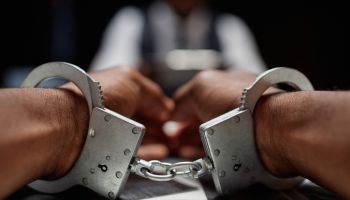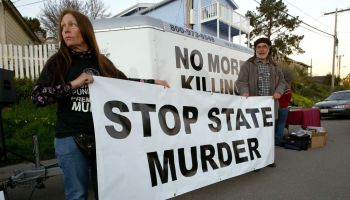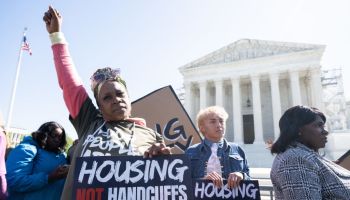UPDATE, May 24, 2012 — 12:00 AM EST:
Jurors deliberated for less than 4 hours on May 2, before finding Pedro Espinoza, 23, guilty of 1st degree murder for the 2008 shooting death of 17-year-old football star Jamiel Shaw Jr. in Los Angeles. They have suggested that he receive the death penalty. Read more here.
———————————————————————————————————————————
Los Angeles High School football star, Jamiel Shaw, Jr., 17, was murdered by gang members three doors from his home because of his red Spider-Man backpack, said Deputy District Attorney Bobby Grace during opening arguments of the trial of the accused, Pedro Espinoza, 23, reports Our Weekly.
LIKE NewsOne On Facebook To Stay Up On Black News Worldwide!
The trial for the March 2, 2008 brutal murder began Monday, April 30, at the Criminal Courts Building in downtown Los Angeles.
Our Weekly reports:
“That was enough for Pedro Espinoza to figure in his head that Jamiel Shaw was a possible enemy of (his gang),” Grace said.
He said Espinoza associated the red color of the backpack with the rival Bloods gang, and that “dovetailed with Jamiel Shaw being a young African-American.”
“Pedro Espinoza would not let this opportunity pass,” he told the jury.
Espinoza, 23, faces a possible death sentence, if convicted of first-degree murder. The murder charge includes the special circumstance allegation that the killing was carried out to further the activities of a criminal street gang, along with an allegation that Espinoza personally and intentionally discharged a handgun.
The defendant still sports a tattoo by his left ear consisting of the initials “B.K.,” which Grace said stands for “Blood Killer.”
RELATED: See the CBS Los Angeles news report here.
According to prosecution, Espinoza ambushed Shaw with an abrupt, “Where you from?” before shooting the teen in the stomach. As Shaw lay crumpled in pain on the ground, Espinoza fired a second shot into his brain, killing him instantly.
At the time of the murder, Shaw’s mother, U.S. Army Sgt. Anita Shaw, was preparing to return home from her second tour in Iraq.
“She called crying, saying, ‘Tell me it’s not my son,’ ” said Jamiel’s aunt, Althea Shaw. “She was so proud. She felt he had made it through the hard times. She still called him her baby, even though he was taller than her.”
Jamiel Shaw, Sr. had just called his son to tell him to hurry up and return home from the mall, not knowing that he was about a block away. After hanging up with his father, Shaw called his girlfriend, Chrystale, to tell her he was almost home when Espinoza approached him. His father says that he had barely hung-up the phone when he heard the shots. Running outside, he saw his son bleeding on the ground, not three doors away from home, reports the L.A. Times.
“[His mother’s] over there trying to protect us from guns and bombs, and then she has to hear that her son is dead over here,” he said at the time. “I’ve got my own personal Iraq now.”
Since his death, Shaw’s parents tried unsuccessfully to sue the county. Espinoza, an alleged member of the 18th Street Gang in L.A., was a dangerous felon and an “immigration violator” according to them, who was just released two days prior to their son’s murder. The Shaws also tried to get a law passed that would allow police to turn over undocumented immigrant gang members to federal authorities. That effort failed as well, reported the Huffington Post.
In the days before his death, Shaw was contacted by both Rutgers University and Stanford University and, according to coach Hardy Williams, he was not only a “Houdini on the football field,” but a genuinely good person:
“He was a very special kid,” Williams said. “Not only was he an outstanding athlete, he was a good person. I’ve never seen Jamiel mad. He had such a big smile.”
His father, battling through his stunned grief at the time of the murder, said that the thought of his son in pain was unbearable to him.
“When he went on the field, he never came out,” the father said. “He’d never been hurt. This is the first time I saw him hurt.”
The parallels between this case of Trayvon Martin are striking. Both young Black men, 17-years-old, walking home to their fathers, talking on the phone with their girlfriends, were gunned down by Hispanic vigilante-thugs, intent on taking “justice” into their own hands, because of an article of clothing — and skin color — that made them suspects.
If convicted of first-degree murder, Espinoza faces a possible death sentence.
SEE ALSO:















